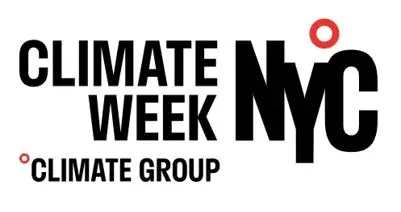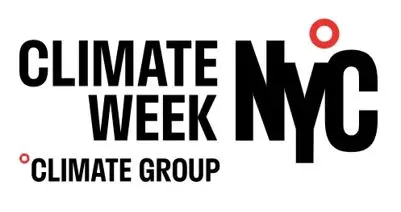Climate Week in New York is the largest annual weather event of its kind, bringing together some 400 events and activities across the city  from New York. This year it will be held from September 17 to 24, 2023. The event takes place annually in partnership with the United Nations General Assembly and is organized in coordination with the United Nations and the City of New York.
from New York. This year it will be held from September 17 to 24, 2023. The event takes place annually in partnership with the United Nations General Assembly and is organized in coordination with the United Nations and the City of New York.
At the start of the week, September 18 and 19, 2023, Climate Group hosts “The Hub Live”. Bringing together more than 1,000 of the most influential leaders from business, government and the climate sector. This year, one of the three main axes was:
“We have made enormous progress, as evidenced by the billions committed by the United States, China and the EU to promote green technologies and energy security. We know we have the solutions to the climate crisis. But how can we guarantee their implementation?
During the two days of “Hub Live”, ARC was present for several sessions including:
-
“Unleash the renovation revolution” with Jennifer Layke of the World Resource Institute
-
“Is integrated energy our next climate hero” With Renae Kezar, Vice President of Global Sustainability at Johnson Controls
-
“Roadmap to renewable energy: streamlining permitting processes and overcoming regulatory hurdles” With Pedro J. Pizarro, President and CEO of Edison International
During the two days of Hub Live, it was very clear that citizens, governments and businesses are ready to make an effort. Climate change, this summer alone, has had a global impact, causing record temperatures, deadly wildfires and massive flooding. In such a short time, Hub Live was full of new announcements, success stories and positive attitudes towards change.
Innovative technology helping to fight climate change
The decision to act on climate change is no longer a question of “what” or “if”. The available technology and software needed to help businesses, governments and organizations achieve their net zero emissions goals is here. Companies including Apple, Google and Siemens have all outlined the innovative and transformative initiatives they are implementing to reduce Scope 1-3 emissions.
Kate Brant, Google’s Chief Sustainability Officer, spoke about its AI technology that Google Maps uses to show its users (green leaf icon) the most sustainable and carbon-efficient route to the selected destination. As the world witnesses the aftermath of flooding in Libya, Kate spoke about Google’s AI feature, which can predict flooding in a given area and warn citizens almost 7 days in advance. Floodhub.com. During an all-female panel, focused on tackling climate change through transformative technology. They were asked: “What is the future for transformative sustainability technologies?” “. An answer that struck me: “we need to present it in a way that it is aimed at small and medium-sized businesses, so that they have access to it”. This journey is not a solitary journey, it will only be successful if it is inclusive and accessible.
The role of the private sector in the energy transition:
Climate Week NYC had broad representation from industries, including the private sector, public sector, and environmental groups. In recent years, the U.S. federal government has invested heavily in clean energy, infrastructure and green jobs. Between the Inflation Reduction Act and the bipartisan Infrastructure Act, billions of dollars are being pumped into the economy from the public sector.
Cara Carmichael, director of federal buildings at the White House Council on Environmental Quality, spoke about Executive Operation 1457, which includes a goal for all federal buildings to be net-zero emissions by 2050. To decarbonize 3 billion square feet by 2050, built-in efficiency, demand flexibility, and carbon-free electricity are critical to success. Senator Wiener, representing California District 11, spoke about his role in the passage of SB253: “The law on corporate climate data accountability ». This is a first-in-the-nation measure requiring carbon emissions information disclosures from companies earning more than $1 billion that operate and do business in California. More than 5,500 companies will be required to begin reporting their scope 1 to 3 emissions to the state starting in 2026. Senator Wiener said the bill will “unleash business innovation” and reminded the audience that “we must constantly play on the offensive.”
Tools for the private sector to succeed:
Sessions offered throughout the event covered topics ranging from technological innovation, regulatory response and corporate social responsibility.
During the flagship session “We can. We will. We lead climate action”, Jim Andrew, Pepsi’s chief sustainability officer, stole the show. He spoke of the importance of standardizing reporting: “Every dollar I spend on reporting is a dollar that isn’t spent mitigating climate change. ». Standardizing reporting will further mitigate climate change while increasing accountability and will also recruit more businesses into the system. “We need more regulation”, innovation is no longer the question, it is implementation. Regulations must be well designed, thoughtful and transparent. Finally, Mr. Andrews also discussed Pepsi’s collaboration with Coco Cola on plastic waste: “positive examples inspire others throughout the value chain”.
Pedro J Pizzaro, President of Edison International, spoke about the bottleneck in transportation deployment due to long queues to acquire new transportation permits. He also noted that “the pace of transport development will have to quadruple that of historical development”. A general theme among many private sector representatives is dissatisfaction with the pace of new U.S. permitting, reporting and guidance regulations.
Conclude:
Climate Week NYC 2023, hosted by the Climate Group, was a pivotal moment, bringing together a diverse group of stakeholders to discuss and showcase innovative solutions and transformative initiatives to combat climate change. The event highlighted the urgency and need for collective action, emphasizing that the tools and technology needed to drive entities towards net zero emissions targets are already available.
The event highlighted the crucial role of the private sector in the energy transition, with substantial investments now being made in clean energy, infrastructure and green jobs made by the US, EU and abroad .
The event also highlighted current challenges, particularly in the area of regulation and implementation.
In conclusion, Climate Week NYC 2023 is a testament to the collective: it highlighted the imperative for unified action, innovation and the implementation of effective solutions and policies. The need for standardization of reporting, transparent policy and accessible technology was highlighted. Industry leaders are advocating for well-designed, thoughtful and transparent regulations to facilitate more effective climate action.
The journey towards a sustainable future does not happen alone; it requires the collaborative efforts of all sectors of society, and this event was an important step in promoting such collaboration.











